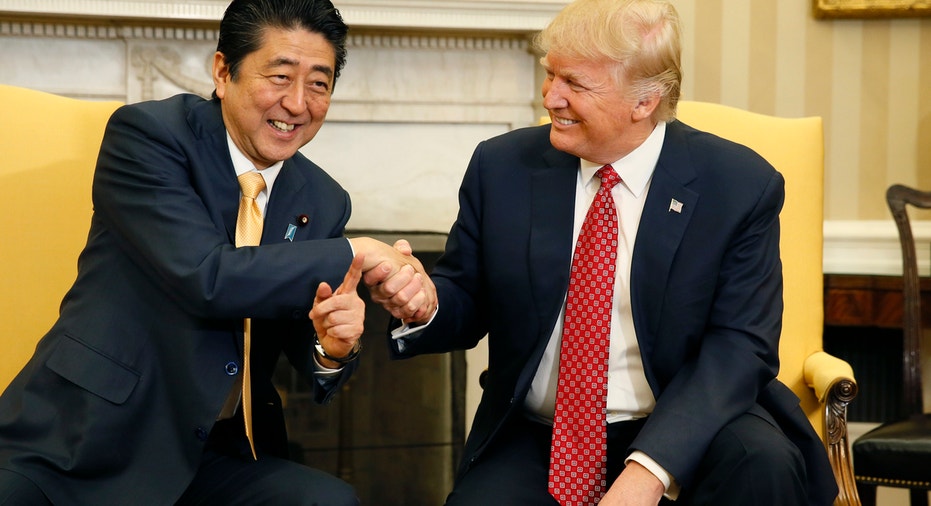Trump, Japan's Abe Discuss Concerns About Trade, Security at Summit

President Donald Trump and Prime Minister Shinzo Abe opened two days of talks on Friday looking to cement a decades-old alliance between Japan and the United States that has been under strain because of the Republican's positions on trade and security.
The two leaders sat down for talks in the Oval Office, shaking hands and smiling for photographers. Abe set a hopeful tone, telling a U.S. Chamber of Commerce breakfast that he wanted to build a relationship of trust with the new U.S. leader.
"I would like to clearly demonstrate the unshakable Japan-U.S. alliance to the world," Abe said ahead of White House meetings.
Still, an air of uncertainty was hanging over their summit after a presidential campaign in which Trump slammed the U.S. treaty obligation to defend Japan and accused the Japanese of stealing American jobs.
After their conversations, Trump and Abe are to stage a joint news conference, have lunch and then fly to Palm Beach, Florida, on Friday afternoon for a weekend stay at Trump's Mar-a-Lago resort.
The two will play golf at one or two of Trump's golf courses in the area.
It will be the most time Trump will have spent with a foreign leader since taking power last month and his second face-to-face meeting with a key ally after talks with British Prime Minister Theresa May two weeks ago. Trump hosted Abe at Trump Tower last year in his first talks with a foreign leader after his surprise win in the November presidential election.
"I think the president just really enjoys his company and wants to not only get to know him better but to have a greater bilateral relationship," White House spokesman Sean Spicer said. "He understands their importance in the region. He values his friendship and looks forward to deepening the relationship."
The U.S. side took steps to get the two leaders off to a positive start by saying Trump would oppose any unilateral declarations that would undermine Japan's administration of disputed islands in the East China Sea.
There have been long-standing tensions between China and Japan over waters in the East China Sea, including islands known as the Senkaku in Japan and the Diaoyu in China.
Trump and Chinese President Xi Jinping held a phone call on Thursday night. Japanese spokesman Norio Maruyama called it a positive development.
"It's good and positive in terms of peace and security of the region and the international community," he told reporters.
AMERICA FIRST
A senior U.S. administration official said Trump was unlikely to raise with Abe his frequent charge that Japan manipulates currency markets to lower its currency. Trump has hurled the same accusation at China.
"I can tell you that's not something that's at the top of the list, but whether it comes up naturally in conversation, we'll see over the course of that meeting," said the official.
Japan has had lingering concerns about what Trump's self-styled "America First" strategy means for U.S. foreign policy in Asia as well as what his decision to withdraw from the Trans-Pacific Partnership trade pact means for bilateral economic ties.
Abe hopes Japanese promises to help create U.S. jobs and bolster Japan's military will persuade Trump to turn down the heat on economic matters and stand by the alliance.
Abe, who will be accompanied by Finance Minister Taro Aso and Foreign Minister Fumio Kishida, will bring a package of steps Tokyo says could create 700,000 U.S. jobs through private-public investment in infrastructure such as high-speed trains, Japanese government sources say.
Japanese officials have been soothed by security assurances from Defense Secretary Jim Mattis and others.
But they worry Trump may go off script, given his recent phone call with Australian Prime Minister Malcolm Turnbull. Leaks of that conversation showed Trump labeled a U.S.-Australian refugee swap deal as "dumb."
"There are concerns about Trump in every allied capital since his awkward phone call recently with Prime Minister Malcolm Turnbull of Australia," said a background paper about the meeting written by Asian experts at the Center for Strategic and International Studies.
"Rather than bring a list of concrete 'asks,' Abe will likely approach this meeting emphasizing how he aligns with Trump on many of his objectives," the paper said.
To avoid questions about whether Japan is paying Trump for Abe to stay at the beachfront Mar-a-Lago retreat, the White House declared that the entire visit there, including golf, is the official gift for Abe from Trump.
It will be Trump's first use of Mar-a-Lago for diplomacy.
(By Steve Holland and Kiyoshi Takenaka; Additional reporting by Linda Sieg; Editing by Andrew Hay and Alistair Bell)



















